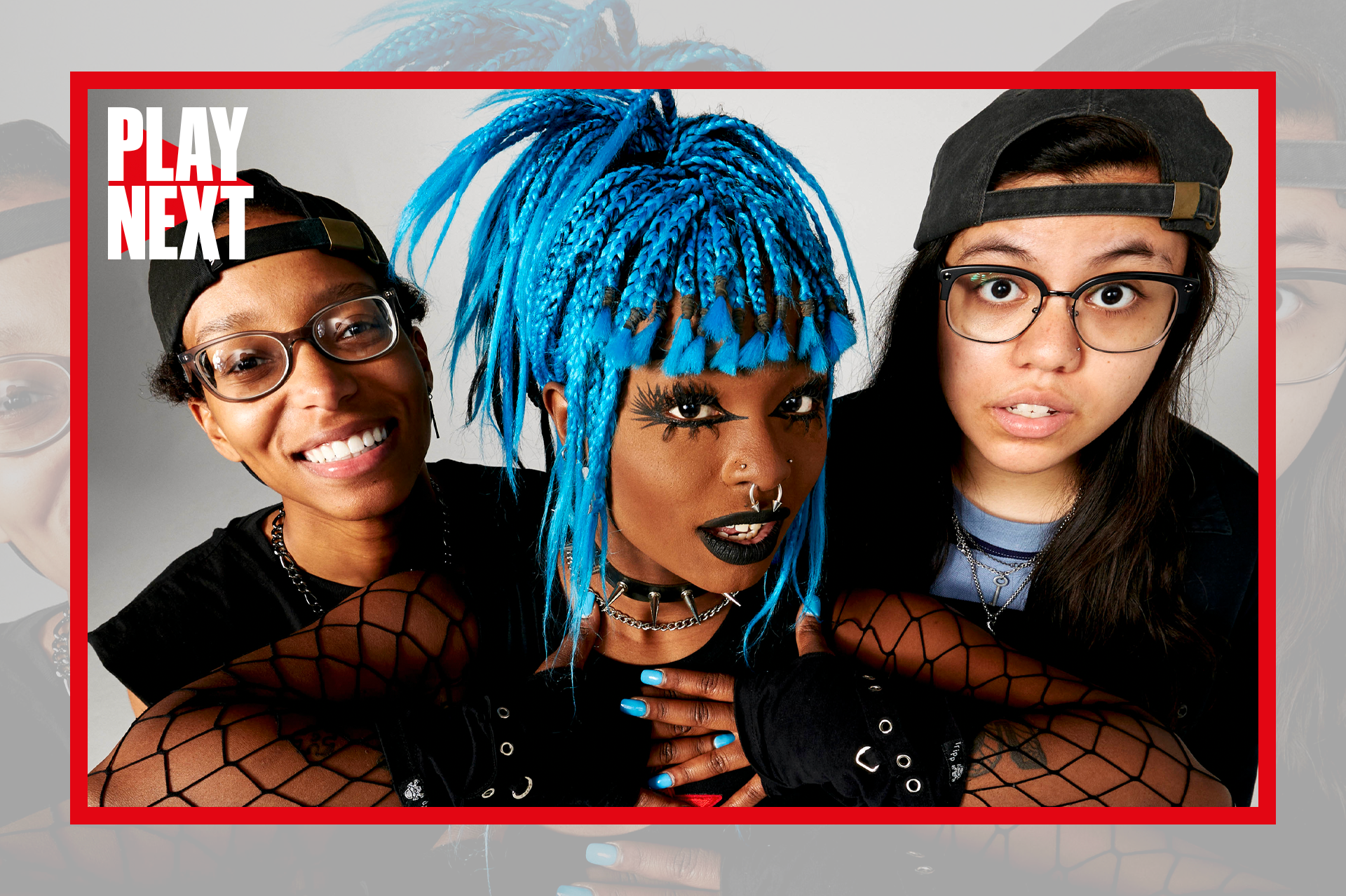Get to know Meet Me @ The Altar, the Gen Z pop-punk trio tipped for greatness
The rising pop-punk stars tell Rolling Stone UK about their debut album 'Past // Present // Future' and why Disney music is ripe for reappraisal
By Emma Wilkes

Right now, the face and sound of pop punk is changing. What was once a largely male genre is opening its mind to influences from other musical worlds, and amplifying the voices of women and people of colour who remained marginalised in its 2000s heyday. It’s no longer about drooling over girls who won’t notice you or getting out of your boring town – nowadays, it’s a broader church.
Since their sunny friendship anthem ‘Garden’ went viral in the depths of the pandemic, Meet Me @ The Altar has been pinpointed as the new wave’s torchbearers. The trio – vocalist Edith Victoria, guitarist Téa Campbell and drummer Ada Juarez – formed in 2015, meeting over the internet and collaborating across state lines. They later signed to Fueled By Ramen, home to emo heavyweights such as Paramore, Fall Out Boy and Twenty One Pilots and were recipients of Halsey’s Black Creators Fund, designed to give Black artists financial support and resources to launch their careers. Their feisty recent single ‘Say It (To My Face)’ reached new ears when it was used in a Taco Bell adverts, with some fans lovingly referring to it as ‘the Taco Bell song’. Even Hayley Williams is a fan, writing the group a letter of encouragement that they still have in their possession.
The trio’s 2021 EP Model Citizen fell into the heavier end of pop-punk in a subgenre affectionately termed ‘easycore’, its slamming riffs counterbalanced by a sweet, youthful sense of optimism. For their debut album, Past // Present // Future, however, a change was due. “Easycore is a very specific, niche sound that not everyone gets,” says Victoria. “For our first album, we didn’t want to put ourselves in that box, because we might not be able to get out of it. We wanted it to be diverse, and we’ve opened a lot of doors for ourselves by doing that.”
“I think there’s always going to be people being like, ‘When’s the breakdown coming in?’” adds Juarez. “But we’re doing this for us. I can’t think of a better way to [respond] to it except from [saying], ‘Get over it’.”
Pop punk in the 2020s has been heavily intertwined with a sense of nostalgia, its resurgence linked to a collective yearning for simpler times. While Meet Me @ The Altar have certainly embraced this feeling, what separates them from the peers is the influences they have drawn from. “We’re not really influenced by scene bands at all,” Campbell asserts. Their bread and butter, rather, is the sounds of the late noughties Disney Channel bands that soundtracked their childhoods, or the powerful pop rock singers dominating the charts of that time, from Kelly Clarkson to Pink to Demi Lovato. They’ve colloquially referred to their new sound as ‘Disneycore’, bringing the sounds of that time under the pop punk umbrella they’ve always belonged to but have never quite been taken seriously enough, particularly since it was targeted towards young girls.
“There’s a stigma around Disney music, where it’s assumed that because it’s Disney, it’s trash,” Campbell continues. “Demi Lovato and the Jonas Brothers were making solid music and they got discredited just because it was Disney.”
While the band are keen to stress that they write only for themselves, but they remain acutely aware of their audience. Their lyrics have become more open, with plenty of space for fans to insert themselves and their own experiences into. “We have a lot of songs on this record that can mean a lot of different things to people,” explains Victoria. “Someone can relate to, for example, ‘A Few Tomorrows’ if they’ve lost someone and they’re grieving, or if they miss their sister who’s in college. We’re not trying to write a specific scenario, but leaving it open so anyone can relate to it.”
In other words, Meet Me @ The Altar are here for all of us. “Everyone wants their looking-out-of-the-car-window-when-it’s-raining moment,” Campbell notes. “There’s something in [this album] for any [life] stage that you’re going through. We want people to feel like a main character when they listen to it.”
